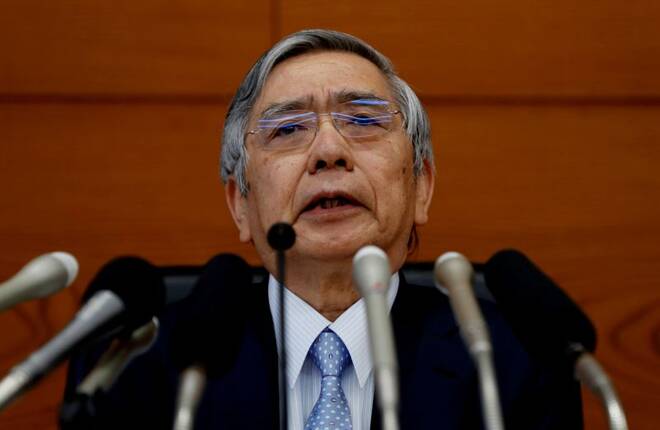Advertisement
Advertisement
Pledging to retain stimulus, BOJ’s Kuroda projects inflation near 1% mid-next yr
By:
TOKYO (Reuters) - Bank of Japan Governor Haruhiko Kuroda said on Monday the country's economy was likely to recover to pre-coronavirus pandemic levels in the first half of 2022.
By Leika Kihara
TOKYO (Reuters) -Bank of Japan Governor Haruhiko Kuroda expects inflation to accelerate to around 1% in the first half of next year as the economy recovers to pre-coronavirus levels, pledging to maintain ultra-easy policy in hopes of a consumption-driven recovery.
With inflation still short of its 2% target, the BOJ will maintain its “powerful” monetary easing and stand ready to ramp up stimulus, even as other central banks head for an exit from crisis-mode policies, Kuroda said on Monday.
“We expect consumer inflation to gradually accelerate to around 1% at about the middle of next year as the output gap turns positive,” he said in a speech to business leaders in Nagoya, central Japan.
“Even if inflation does hit 1%, it’s still quite distant from our 2% target. As such, we will absolutely not consider dialing back or abandoning ultra-loose policy,” Kuroda told a news conference after meeting with the business leaders.
Kuroda said the recovery in the world’s third-largest economy has been “somewhat slower than initially expected,” as COVID-19 curbs and parts shortages hit consumption and output.
“But the mechanism for an economic recovery remains intact,” he said, adding that growth is seen recovering to pre-pandemic levels in the first half of 2022 as the lifting of state of emergency curbs helps revive consumption.
While automakers are grappling with supply constraints, bottlenecks blamed on factory shutdowns in Southeast Asia are likely to be resolved in coming months, Kuroda said.
Chip shortages, however, could take longer to fix as capacity must be ramped up through capital expenditure to meet robust demand, the governor added.
“If the global supply constraint lasts longer than expected, that could hurt Japan’s exports and corporate profits by leading to a slowdown in global growth and a rise in cost,” Kuroda said.
Japan’s economy shrank much faster than expected in the third quarter as supply disruptions and a spike in infections hit business and consumer spending.
Kuroda said the economy will rebound in the current quarter as the Sept. 30 end of COVID-19 curbs props up consumption. He also brushed aside concern over rising commodity prices, saying it reflected robust global demand.
“It’s true prices of gasoline and some food products are rising. But that’s not having a huge negative impact on the economy,” he said.
Japan has not been immune to the global commodity inflation with wholesale prices rising at the fastest pace in four decades in October. But core consumer inflation has hovered around zero as weak consumption prevent firms raising prices.
(Reporting by Leika KiharaEditing by Chang-Ran Kim, Raju Gopalakrishnan & Shri Navaratnam)
About the Author
Reuterscontributor
Reuters, the news and media division of Thomson Reuters, is the world’s largest international multimedia news provider reaching more than one billion people every day. Reuters provides trusted business, financial, national, and international news to professionals via Thomson Reuters desktops, the world's media organizations, and directly to consumers at Reuters.com and via Reuters TV. Learn more about Thomson Reuters products:
Did you find this article useful?
Latest news and analysis
Advertisement
